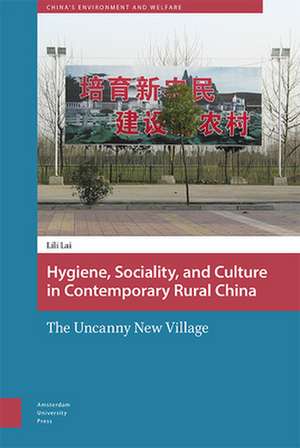Hygiene, Sociality, and Culture in Contemporary Rural China: The Uncanny New Village: Environment and Society in Asia
Autor Lili Laien Limba Engleză Hardback – 13 oct 2016
This book presents a new perspective on attempts by the contemporary Chinese government to transform the diverse conditions found in countless rural villages into what the state’s social welfare program deems “socialist new villages.” Lili Lai argues that an ethnographic focus on the specifics of village life can help destabilize China’s persistent rural-urban divide and help contribute to more effective welfare intervention to improve health and hygienic conditions of village life.
Preț: 555.95 lei
Preț vechi: 847.28 lei
-34% Nou
Puncte Express: 834
Preț estimativ în valută:
106.40€ • 109.91$ • 88.55£
106.40€ • 109.91$ • 88.55£
Carte indisponibilă temporar
Doresc să fiu notificat când acest titlu va fi disponibil:
Se trimite...
Preluare comenzi: 021 569.72.76
Specificații
ISBN-13: 9789089648464
ISBN-10: 9089648461
Pagini: 248
Dimensiuni: 152 x 235 x 20 mm
Greutate: 0.52 kg
Editura: Amsterdam University Press
Colecția Amsterdam University Press
Seria Environment and Society in Asia
ISBN-10: 9089648461
Pagini: 248
Dimensiuni: 152 x 235 x 20 mm
Greutate: 0.52 kg
Editura: Amsterdam University Press
Colecția Amsterdam University Press
Seria Environment and Society in Asia
Notă biografică
Lili Lai is a postdoctoral researcher with the Institute of Medical Humanities at the University of Southampton.
Cuprins
Acknowledgements
Preface
Preface
- The local intimacies of China’s Rural-Urban Divide
- The rural-urban divide as a mobile and relative dyad
- Seeing like a state: a sketch of the making of rural-urban divide
- The discourse of “the three-nong question”
- Situating the research, methodology and theoretical basis
- An Overview of Shang Village
- Dirt, Hygiene, Habitus
- House, home, and family
- Daily hygiene
- Weisheng
- New house, new village
- Unavoidable trash
- Uncanny modernization
- Immanent Sociality: open-ended belonging
- The Xiaogang village paradox
- Society of familiars
- Everyday sociality
- The art of social relations
- Migration: a general background
- Migrant life: reproducing belonging
- New village, new families
- Culture Plaza: why culture? Whose Plaza?
- Building the culture plaza
- Cultivating a new type of peasant who has wenhua
- Planting poplars to develop the economy
- Interpreting the “scriptures” from above
- Everyday life and the travels of “culture”
- Discerning wenhua, the cultural
- The Uncanny New Village
- Reference
- Index

